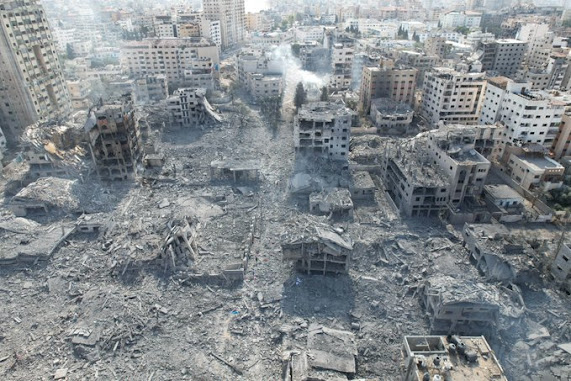The humanitarian tragedy in Gaza has cast a long shadow over international events to mark 75 years since the adoption of the Universal Declaration of Human Rights, serving as the starkest illustration in decades of the failure to implement these rights fully for Palestine Refugees.
“Human rights apply to everyone, without distinction, whoever they are and wherever they are. But for Palestine Refugees the promise of universal rights enshrined in the Universal Declaration of Human Rights has rarely seemed so distant, and the challenges to realising these rights seldom so daunting,” said Stephanie Case, Chief of the Protection Division at UNRWA.
“It is disregard for human rights that has led us to where we are today. Adherence to human rights is crucial to for an alternative future where stability, peace and justice prevail.”
Amid international outcry about the catastrophic humanitarian consequences of the war in Gaza, it is essential to bring back to the centre of all policy and public discussions the baseline for human dignity that the international community agreed to in 1948: the Universal Declaration of Human Rights.
The 75th anniversary of this landmark accord, marked last week, coincides with the 75th year since the Nakba – the mass forced displacement of Palestinians.
Since the beginning of the war in Gaza in October, the Israeli Authorities have forcibly moved up to 1.9 million Gazans from their homes, in the largest forced displacement of Palestinians since 1948.
Although different in scope, both international human rights law and international humanitarian law provide protection to persons during armed conflict. Human rights apply at all times, both during peace and in war. They are universal, inherent in all individuals, and include the rights to life, food, health, housing, education, and freedom of movement
UNRWA, founded in 1949, has worked since its inception to safeguard the rights of Palestine Refugees, notably to health and education, by providing essential services. In Gaza, this has been completely derailed by the war.
Conditions in Gaza are catastrophic. Under relentless bombardment, thousands of civilians have been killed, the majority of them women and children, with 136 UNRWA staff among those killed, the highest in the history of the United Nations.
An entire population of 2.2 million people are being denied food, water, medical supplies, and other basics of survival, as diseases loom large. Whole neighbourhoods have been destroyed and emptied of their inhabitants. Nearly 1.4 million people are now sheltering in 155 UNRWA installations – mostly schools transformed into overcrowded emergency shelters – seeking safety under the UN flag. This has not stopped UNRWA installations from being hit, resulting in further loss of life and injury – to date, 115 UNRWA buildings have been damaged in bombardments, resulting in almost 300 deaths and over 1,000 injuries.
In the West Bank, meanwhile, escalating violence has reached levels not seen in two decades. Palestine Refugees are leaving the camps where they live in growing numbers, driven by fear and insecurity. More refugees have been killed in the last two months than in any single year since the UN started documenting fatalities in 2005.
The attacks by Hamas on 7 October were abhorrent and an assault against human rights. Taking civilians as hostages, including women and children, is prohibited under international law and unacceptable.
There must be an immediate humanitarian ceasefire. International law
must be upheld, and there must be accountability for violations.
Humanitarian aid must be allowed to enter Gaza and delivered throughout
Gaza in a safe, rapid, unimpeded, and sustainable way to those in need.
And the human rights we acknowledge today for all human beings must be
respected and protected for Palestinians.

No comments:
Post a Comment